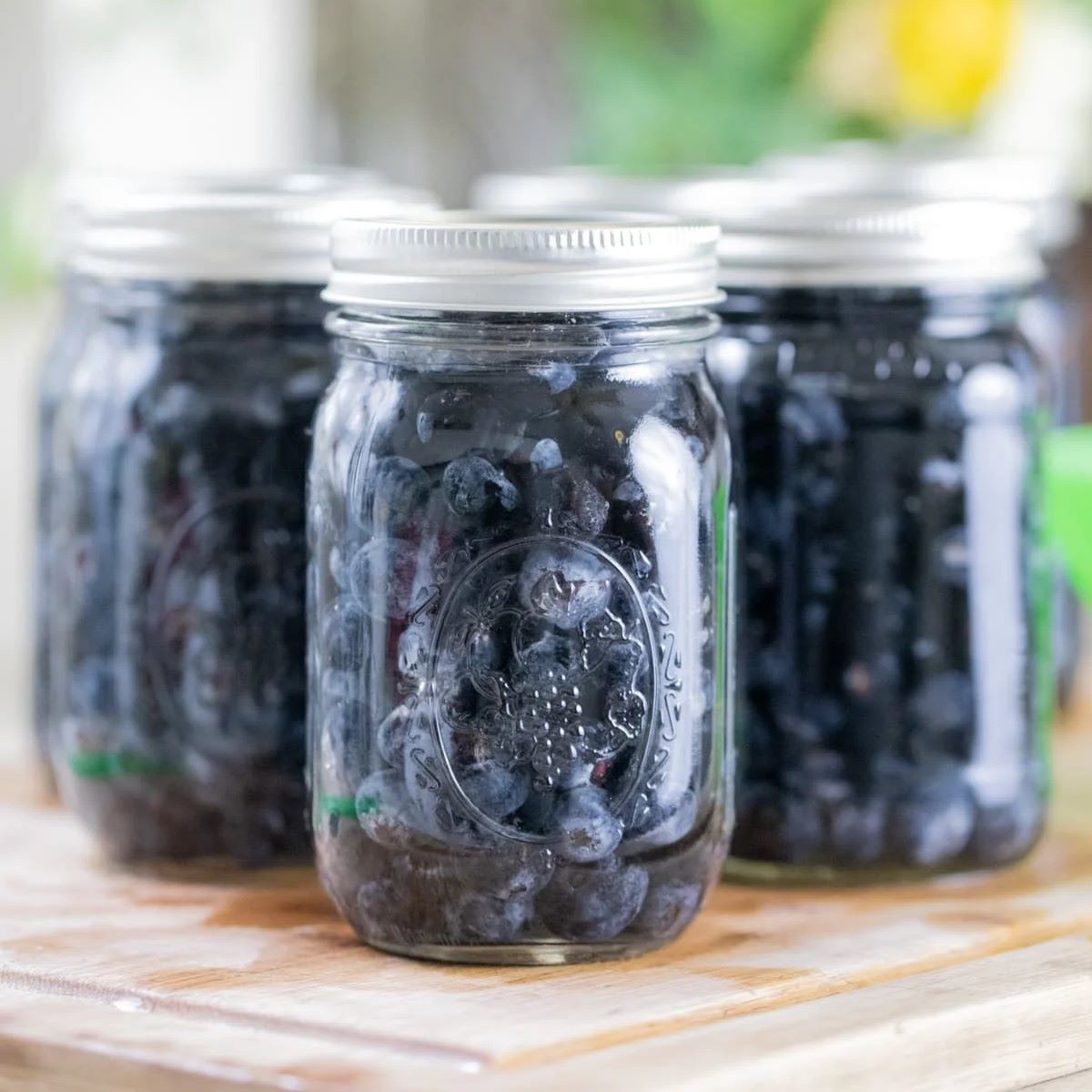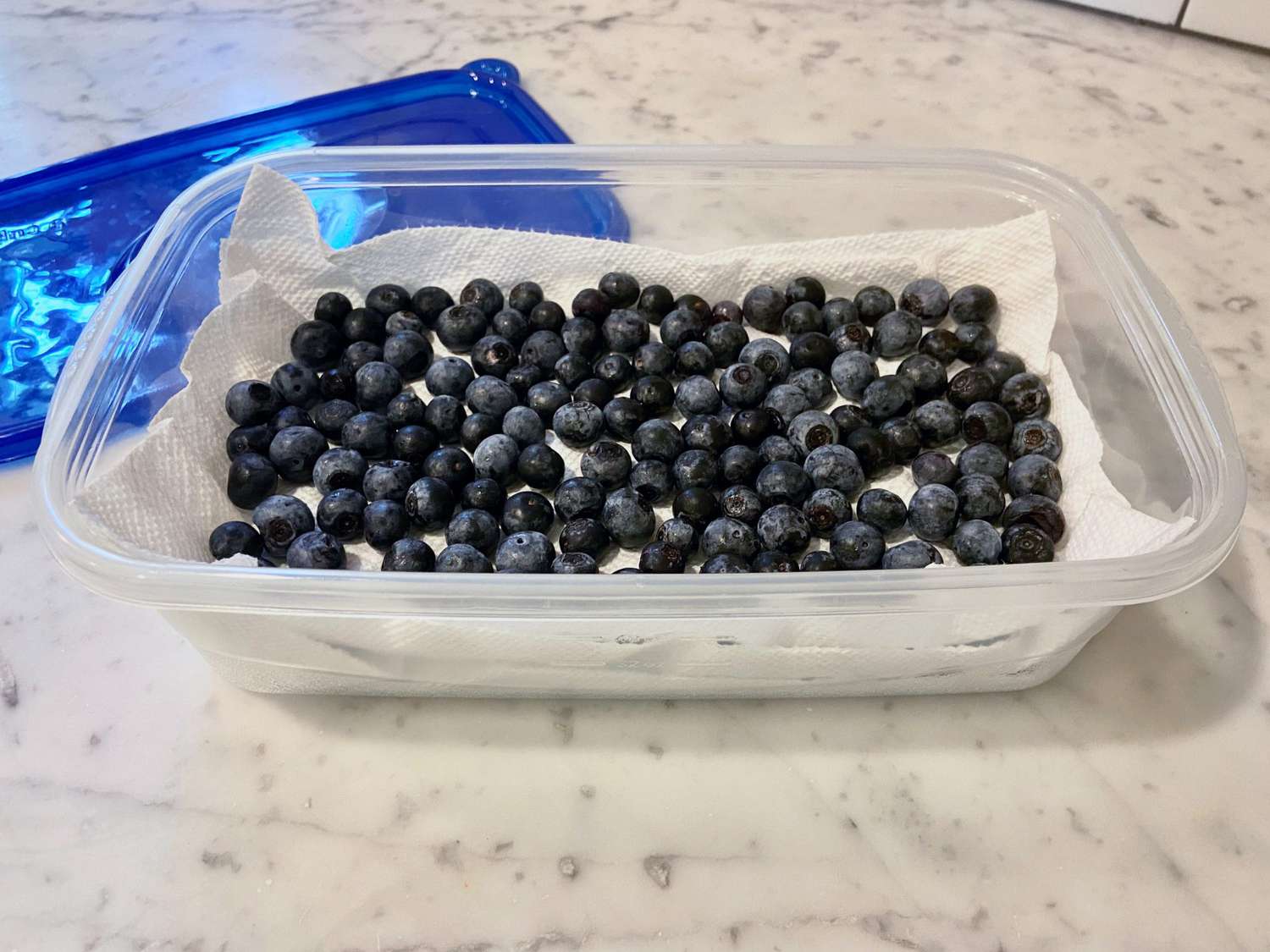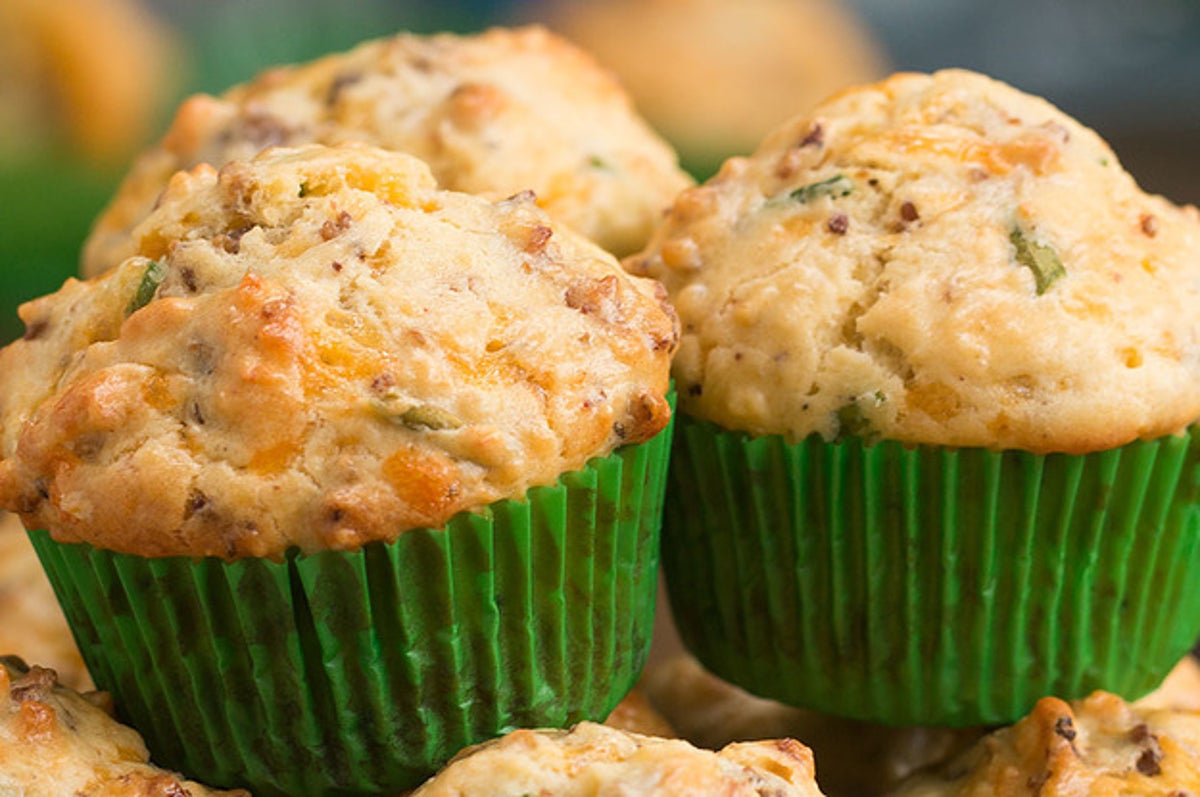

Articles
How To Store Blueberry Muffins
Modified: December 7, 2023
Looking for articles on how to store blueberry muffins? Find helpful tips and tricks to keep your muffins fresh and delicious for longer!
(Many of the links in this article redirect to a specific reviewed product. Your purchase of these products through affiliate links helps to generate commission for Storables.com, at no extra cost. Learn more)
Introduction
Blueberry muffins are a delightful treat that can be enjoyed any time of day. Whether you savor them for breakfast, as a snack, or as a dessert, it’s important to know how to properly store them to maintain their freshness and flavor. Many people are unaware that the way blueberry muffins are stored can greatly affect their shelf life and overall quality.
In this article, we will explore the importance of proper storage for blueberry muffins and discuss the factors that can negatively impact their shelf life. We will also provide you with helpful tips and best practices for storing blueberry muffins, including freezing methods for extended storage. By following these guidelines, you will be able to enjoy your blueberry muffins for longer periods of time without sacrificing their delectable taste.
So, if you’re ready to learn how to make your blueberry muffins stay fresh and delicious, let’s dive into the world of proper storage techniques!
Key Takeaways:
- Proper storage is crucial for maintaining the freshness, flavor, and texture of blueberry muffins. Factors like moisture control, temperature, and handling practices significantly impact their shelf life.
- Freezing blueberry muffins extends their storage life, preserving their taste and freshness. Thaw and reheat them properly to enjoy a warm and delightful treat anytime.
Read more: How To Store Pumpkin Muffins
Importance of Proper Storage for Blueberry Muffins
Properly storing blueberry muffins is crucial in maintaining their quality and extending their shelf life. When muffins are not stored correctly, they can quickly become stale, dry out, or even develop mold. By following the recommended storage methods, you can ensure that your blueberry muffins retain their freshness and mouthwatering flavor.
One of the main reasons why proper storage is important is to prevent the muffins from drying out. Muffins are primarily made up of flour, which absorbs moisture from the environment. If left exposed to air, they will lose their moisture and become dry and crumbly. The lack of moisture not only affects the texture but also makes the muffins less enjoyable to eat.
In addition to drying out, blueberry muffins are also susceptible to mold growth. Mold thrives in moist environments, and baked goods provide an ideal breeding ground for it. By storing your muffins properly, you can minimize the risk of mold contamination, ensuring that your muffins are safe to eat.
Furthermore, proper storage helps to preserve the flavor of blueberry muffins. Blueberries add a burst of juicy sweetness to the muffins, but their flavor can diminish over time. By storing the muffins correctly, you can slow down the oxidation process and prolong the freshness of the blueberries. This ensures that each bite of your muffins is packed with the delightful taste of fresh blueberries.
Another important aspect of storing blueberry muffins properly is the prevention of staleness. Staleness occurs when the muffins lose their moisture and become hard and tough. By utilizing appropriate storage methods, such as sealing them in an airtight container, you can prevent air from reaching the muffins and maintain their soft, moist texture.
It’s also worth noting that proper storage allows you to enjoy your blueberry muffins for an extended period of time. By following the correct storage techniques, you can keep your muffins fresh and delicious for several days, allowing you to savor them at your own pace without the need to consume them all at once.
Overall, proper storage for blueberry muffins is essential to preserve their texture, flavor, and freshness. By investing a little time and effort into storing them correctly, you can maximize their shelf life and ensure that every bite is as delightful as the first.
Factors Affecting the Shelf Life of Blueberry Muffins
Several factors can have an impact on the shelf life of blueberry muffins. Understanding these factors can help you make informed decisions regarding their storage and ensure that you enjoy them at their best for as long as possible.
1. Moisture Control:
The level of moisture in the surroundings can greatly affect the shelf life of blueberry muffins. Excessive moisture can cause them to become soggy, while too little moisture can lead to drying out. It’s important to strike a balance and store them in a cool, dry place to maintain their texture and prevent bacteria or mold growth.
2. Temperature:
Temperature plays a crucial role in preserving the freshness of blueberry muffins. Storing them at room temperature is generally recommended for short-term storage, as it allows for optimal flavor and texture. However, high temperatures can hasten the spoilage process, while extremely cold temperatures can cause the muffins to lose moisture and become stale.
Read more: How To Store Blueberry Pie
3. Exposure to Air:
Exposure to air is another factor that can affect the shelf life of blueberry muffins. Oxygen in the air causes oxidation, which can impact the flavor and freshness of the muffins. To minimize air exposure, it is best to store muffins in airtight containers or wrap them tightly in plastic wrap.
4. Ingredient Quality:
The quality of the ingredients used in making blueberry muffins can also influence their shelf life. Fresh, high-quality ingredients will result in a better-tasting and longer-lasting product. This includes using fresh blueberries, good quality flour, and other baking ingredients that are not past their expiration date.
5. Handling and Storage Practices:
The way muffins are handled and stored can significantly impact their shelf life. Touching muffins with dirty hands or exposing them to unclean surfaces can introduce bacteria and shorten their freshness. Additionally, improper storage practices, such as leaving them uncovered on the countertop, can accelerate moisture loss and spoilage.
6. Preservatives:
Some commercially made blueberry muffins may contain preservatives to extend their shelf life. While these additives can help prolong freshness, it’s important to note that homemade muffins typically do not contain preservatives. Therefore, proper storage techniques become even more crucial in maintaining the quality of homemade blueberry muffins.
By taking these factors into consideration and implementing proper storage practices, you can maximize the shelf life of your blueberry muffins and ensure that they stay fresh and delicious for an extended period of time.
Read more: How To Store Blueberries In Tupperware
Preparing Blueberry Muffins for Storage
Before you can store blueberry muffins, it’s important to properly prepare them to ensure that they retain their texture, flavor, and freshness. By following these steps, you can set the stage for successful storage and enjoy delightful muffins even after several days.
1. Allow Muffins to Cool:
After baking your blueberry muffins, give them ample time to cool down completely. This is crucial to avoid condensation forming inside the storage container, which can lead to a soggy texture. Ideally, place the muffins on a wire rack and let them cool for at least an hour before proceeding with storage.
2. Choose the Right Storage Container:
When selecting a storage container for your muffins, opt for an airtight container or a resealable plastic bag. These containers will help minimize air exposure, preventing the muffins from drying out or becoming stale. Additionally, make sure the container is clean and free from any residual odors that could impact the taste of the muffins.
3. Line the Container:
To further protect the muffins during storage, you can line the storage container with parchment paper or aluminum foil. This will provide an additional layer of protection, preventing the muffins from sticking to the container and making them easier to remove when it’s time to enjoy them.
Read more: How To Store Muffins In Freezer
4. Place Muffins in Single Layers:
When placing the muffins inside the storage container, it’s best to arrange them in a single layer. This allows for even air circulation and helps avoid any unnecessary pressure or squishing of the muffins. If you have multiple layers, place a sheet of parchment paper or wax paper between each layer to prevent them from sticking together.
5. Seal the Container Properly:
Sealing the container tightly is vital to keep the muffins fresh for as long as possible. Ensure that the lid is securely closed or that the plastic bag is tightly sealed. This will help to maintain the moisture level within the container, preventing the muffins from drying out and protecting them from environmental factors such as humidity and odors.
6. Store in the Right Location:
Finally, find the optimal storage location for your blueberry muffins. A cool, dry place away from direct sunlight is ideal. Avoid storing them near the stove or any other heat sources, as it can accelerate the spoilage process. A pantry or cupboard is often a suitable spot for storing muffins, as long as the temperature and humidity levels remain stable.
By following these steps to prepare your blueberry muffins for storage, you can ensure that they are well-protected and ready to be enjoyed whenever you crave a delicious treat. Taking the time to properly prepare and store your muffins will ensure that they maintain their quality and stay fresh for an extended period of time.
Best Practices for Storing Blueberry Muffins
Proper storage practices are key to maintaining the freshness and quality of blueberry muffins. By following these best practices, you can ensure that your muffins stay delicious for an extended period of time:
Read more: How To Store Washed Blueberries
1. Store at Room Temperature:
Blueberry muffins are best stored at room temperature for short-term storage, typically up to 2-3 days. Make sure to find a cool, dry area in your kitchen or pantry away from direct sunlight or heat sources. Avoid storing them in the refrigerator, as the cold temperature can cause the muffins to dry out.
2. Use Airtight Containers:
To prevent air exposure, use airtight containers to store your blueberry muffins. Choose containers that are the right size to avoid excess space that can lead to moisture loss. Airtight containers help preserve the muffins’ moisture and protect them from absorbing odors from other foods in your kitchen.
3. Wrap Individually:
If you prefer to store your muffins individually, you can wrap each muffin tightly in plastic wrap or foil. This method is especially useful if you plan to consume the muffins over a longer period of time. Wrapped muffins can be easily grabbed and enjoyed on the go.
4. Avoid Cutting Muffins in Advance:
If you have leftover muffins, it’s best to keep them whole until ready to eat. Cutting muffins exposes more surface area to air, causing them to dry out faster. By keeping them intact, you can preserve their moisture and freshness for longer.
Read more: How To Store Fresh Blueberries
5. Minimize Handling:
When retrieving muffins from their storage container, try to handle them as minimally as possible. Frequent handling can transfer oils from your hands, which can lead to spoilage and affect the texture and taste of the muffins. Use clean utensils or gloves to handle the muffins, if necessary.
6. Avoid Refrigeration:
Although storing blueberry muffins in the refrigerator can help extend their shelf life, it can also cause them to dry out faster. The colder temperature can accelerate moisture loss, resulting in a less enjoyable texture. It’s generally best to store muffins at room temperature for optimal freshness.
7. Take Note of Expiration Date:
If your muffins were store-bought or contain perishable ingredients, keep track of their expiration date. Pay attention to any specific instructions provided by the manufacturer or bakery regarding storage recommendations. Consuming the muffins before their expiration date will ensure they are at their freshest.
By implementing these best practices, you can prolong the shelf life of your blueberry muffins and ensure that each bite is as moist and flavorful as the first. With proper storage techniques, you can enjoy these delightful treats over multiple days, without compromising their quality.
Freezing Blueberry Muffins for Extended Storage
If you want to extend the storage life of your blueberry muffins beyond a few days, freezing them is an excellent option. Freezing muffins not only preserves their freshness and taste but also allows you to enjoy them at your convenience. Follow these steps to freeze your blueberry muffins:
Read more: How To Store Strawberries And Blueberries
1. Cool the Muffins Completely:
Before freezing, ensure that the muffins are completely cooled to room temperature. This prevents condensation from forming inside the storage container, which can lead to a loss of quality and texture.
2. Wrap Muffins Individually:
To maintain the best quality and prevent freezer burn, it’s best to wrap each muffin individually. Use plastic wrap or aluminum foil to tightly wrap each muffin, ensuring that it is fully covered. This will help preserve their moisture while protecting them from freezer odors.
3. Place in Freezer Bags or Containers:
Once the muffins are individually wrapped, place them in a freezer-safe resealable bag or airtight container. Make sure to squeeze out any excess air from the bag before sealing it. If using a container, leave a little space at the top to allow for expansion while freezing.
4. Label and Date:
Always label the bags or containers with the contents and date of freezing. This helps you keep track of how long the muffins have been frozen and ensures proper rotation of your frozen goodies.
Read more: How To Store English Muffins
5. Freeze Flat:
For efficient storage and to prevent muffins from sticking together, place the wrapped muffins in a single layer in the freezer bag or container. If you have multiple layers, separate them with parchment paper to avoid them freezing into a solid mass.
6. Store in Freezer:
Place the freezer bags or containers with the wrapped blueberry muffins in the freezer. Ensure they are placed on a flat surface to maintain their shape and prevent them from getting squished. Avoid placing heavy items on top of the muffins to preserve their delicate texture.
7. Freezing Time:
Blueberry muffins can be stored in the freezer for up to 2-3 months without significant loss of quality. However, for the best taste and texture, it’s recommended to consume them within 1-2 months.
When you’re ready to enjoy your frozen blueberry muffins, simply remove them from the freezer and thaw them following the proper methods.
Note: The freezing instructions mentioned above are for homemade blueberry muffins. If you have store-bought muffins, it’s always advisable to check the packaging for specific freezing instructions provided by the manufacturer.
By freezing your blueberry muffins, you can have a ready-to-enjoy treat anytime, whether it’s for a quick breakfast or a delightful snack. With proper freezing techniques, you can preserve the taste and freshness of your muffins for an extended period and minimize food waste.
Thawing and Reheating Frozen Blueberry Muffins
After freezing your blueberry muffins for extended storage, you’ll want to properly thaw and reheat them to enjoy their deliciousness. Follow these steps to thaw and reheat your frozen muffins:
Read more: How To Store Banana Muffins
1. Thawing:
The best way to thaw frozen blueberry muffins is by allowing them to thaw naturally at room temperature. Remove the desired number of muffins from the freezer bag or container and place them on a plate or cooling rack. Let them sit at room temperature for about 1-2 hours, or until the muffins are fully thawed.
Alternatively, you can microwave muffins for a quick thaw. Place individual muffins on a microwave-safe plate and use the defrost setting or microwave them at a low power level in short intervals, rotating them occasionally. Be careful not to overheat the muffins, as this can lead to them becoming rubbery or soggy.
2. Reheating:
Once the muffins are thawed, you have the option to enjoy them at room temperature or gently warm them up. Here are a few ways to reheat your blueberry muffins:
- Toast Oven or Conventional Oven: Preheat your oven to 325°F (163°C). Place the thawed muffins directly on the oven rack or a baking sheet and heat them for 5-10 minutes, or until they are warmed through.
- Microwave: If you prefer a quick reheating method, you can use the microwave. Place a thawed muffin on a microwave-safe plate and heat it on high for 10-15 seconds. Keep an eye on the muffin to prevent it from becoming dry.
- Steamer or Steaming Basket: If you want to reheat multiple muffins simultaneously, you can use a steamer or steaming basket. Place the thawed muffins in the steamer and steam them for 2-3 minutes until warmed throughout.
Remember to monitor the reheating process closely to avoid overheating, which can lead to dry or rubbery muffins.
3. Enjoying:
Once your blueberry muffins are thawed and reheated, you can enjoy them as is or get creative with toppings and spreads. They can be enjoyed plain, with a dollop of butter, a drizzle of honey, or even with cream cheese frosting for an extra indulgent treat.
Keep in mind that reheated muffins may not be as moist as when they were freshly baked. However, the flavors and aroma should still be delicious, and the reheated muffins will be a delightful treat to enjoy.
It’s worth noting that once you thaw and reheat frozen blueberry muffins, they are best consumed immediately. Avoid refreezing previously frozen muffins, as the texture and taste may be compromised.
With these simple steps, you can thaw and reheat your frozen blueberry muffins to enjoy a warm and scrumptious treat anytime you desire!
Tips for Maintaining Freshness and Flavor of Stored Blueberry Muffins
To ensure that your stored blueberry muffins maintain their freshness and delectable flavor, consider these helpful tips:
Read more: How To Store Costco Muffins
1. Store in Airtight Containers:
Using airtight containers or resealable plastic bags is essential to protect your blueberry muffins from air exposure. This helps prevent moisture loss and keeps them from becoming dry or stale. Ensure the containers are properly sealed to maintain freshness.
2. Avoid Moisture:
Moisture can lead to mold growth and a loss of quality in your muffins. Be sure to store them in a cool, dry place away from excessive humidity or moisture sources. Avoid storing muffins in the refrigerator, as the moisture can cause them to become soggy.
3. Individual Wrapping:
If you prefer to store your muffins individually, wrap them tightly in plastic wrap or foil. This helps maintain their shape and prevents them from drying out. It also allows for easier portioning and grabbing a single muffin when needed.
4. Use Fresh Blueberries:
When making blueberry muffins, ensure you use fresh blueberries that are ripe and in season. Fresh blueberries will add a burst of flavor to your muffins and keep them moist. Avoid using overripe or mushy blueberries, as they can affect the overall texture and taste.
Read more: How To Store Blueberries In The Fridge
5. Avoid Room Temperature for Extended Storage:
While storing blueberry muffins at room temperature is suitable for short-term storage, for longer shelf life, consider freezing them. Room temperature storage is ideal for immediate consumption, typically within 2-3 days. For extended storage, freezing is recommended.
6. Label and Date:
When storing muffins, be sure to label the container or bag with the date of storage. This way, you can easily track how long they have been stored and ensure you consume them within the recommended timeframe for the best taste and texture.
7. Avoid Cutting in Advance:
Avoid cutting your muffins in advance, as this exposes more surface area to air, leading to faster moisture loss. Keep them whole until ready to eat to maintain their freshness and texture for a longer period.
8. Don’t Store with Strong Odors:
Avoid storing blueberry muffins near strong-smelling foods. Muffins can absorb odors easily, which may alter their flavor. Keep them in a separate storage area or use odorless containers to preserve their original taste.
Read more: How To Store Blueberries To Last Longer
9. Consume Within recommended Timeframe:
For the best flavor and texture, aim to consume your stored blueberry muffins within the recommended timeframe. Freshly baked muffins are typically best enjoyed within a few days, while frozen muffins can maintain their quality for up to 2-3 months. Be sure to check the specific storage guidelines for your muffins.
By following these tips, you can ensure that your stored blueberry muffins remain fresh, flavorful, and enjoyable to consume even after several days. Implementing proper storage practices and considering the factors that affect their longevity will help you make the most of your delicious homemade or store-bought treats.
Conclusion
Proper storage techniques are essential for maintaining the freshness, flavor, and overall quality of blueberry muffins. By understanding the importance of storage, the factors that affect shelf life, and the best practices for storing, freezing, thawing, and reheating, you can ensure that your blueberry muffins remain delicious and enjoyable for an extended period of time.
Remember to cool your muffins completely before storing them and choose airtight containers or individual wrapping to protect them from air exposure. Consider your storage location, temperature, and moisture levels to maintain optimal freshness. Freezing blueberry muffins can further extend their storage life, allowing you to enjoy them at your convenience. Thawing and reheating properly ensures that the muffins are warmed through without sacrificing texture and taste.
In addition, taking extra steps such as using fresh ingredients, proper handling, avoiding cutting in advance, and consuming within the recommended timeframe can further enhance the freshness and flavor of your stored blueberry muffins.
By applying these tips and techniques, you can maximize the enjoyment of your blueberry muffins and minimize waste. Whether you’re making homemade muffins or storing store-bought ones, implementing proper storage practices and following the recommended guidelines will help you savor these delightful treats for longer periods, without compromising their deliciousness.
So, the next time you have a craving for blueberry muffins or find yourself with leftovers, remember to utilize these storage methods and tips to ensure that every bite is as scrumptious as the first. Happy storing and enjoy the deliciousness of your perfectly preserved blueberry muffins!
Frequently Asked Questions about How To Store Blueberry Muffins
Was this page helpful?
At Storables.com, we guarantee accurate and reliable information. Our content, validated by Expert Board Contributors, is crafted following stringent Editorial Policies. We're committed to providing you with well-researched, expert-backed insights for all your informational needs.





0 thoughts on “How To Store Blueberry Muffins”